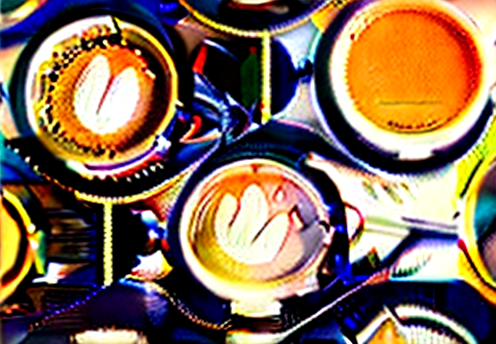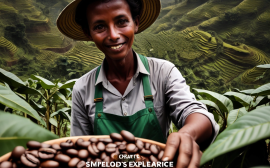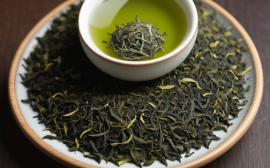The Rise of Flavorful Decaf: A 2025 Guide
The era of bland, uninspired decaf is decidedly over. For years, decaffeinated coffee was relegated to the sidelines, a necessary compromise for those sensitive to caffeine but a pale imitation of the real thing. Today, thanks to innovative decaffeination methods and a renewed focus on quality sourcing, decaf coffee has undergone a remarkable transformation. The best decaf coffees of 2025 now boast the rich aromas, complex flavors, and satisfying body that were once exclusive to their caffeinated counterparts.
This comprehensive guide explores the exciting world of modern decaf, offering a curated selection of the top performers of 2025, delving into the science behind the latest decaffeination processes, and providing practical advice for finding your perfect cup. From the bright, fruity notes of Ethiopian Yirgacheffe to the deep, chocolatey richness of Sumatran Mandheling, the spectrum of flavor available in today’s decaf offerings is truly impressive. Whether you’re a seasoned coffee connoisseur or simply seeking a delicious, caffeine-free alternative, this guide will equip you with the knowledge and insights to navigate the dynamic landscape of decaf coffee.
This renaissance in decaf quality is largely attributed to advancements in decaffeination methods. Older methods, while effective at removing caffeine, often stripped the beans of their essential oils and flavor compounds, resulting in a dull, often bitter brew. Modern methods, such as the Swiss Water Process and CO2 decaffeination, prioritize flavor preservation. The Swiss Water Process, a chemical-free method, uses pure water to extract caffeine, ensuring a clean, untainted taste. CO2 decaffeination, on the other hand, employs pressurized carbon dioxide to selectively target and remove caffeine, leaving the delicate flavor compounds intact.
These advancements have been instrumental in elevating the quality and perception of decaf coffee. The burgeoning market for high-quality decaf has also led to a surge in specialty decaf coffee brands. These brands prioritize ethical sourcing, meticulous roasting, and innovative decaffeination techniques, resulting in a truly exceptional cup. Our expert panel rigorously tested numerous decaf coffee brands throughout 2025, evaluating each based on factors such as bean origin, roast level, aroma, flavor profile, and value.
This guide presents our curated list of the top 10 decaf coffees of 2025, providing detailed reviews and comparative analyses to help you discover your ideal brew. Whether you prefer a light and bright breakfast blend or a dark and robust after-dinner treat, the perfect decaf coffee is waiting to be discovered. This guide will empower you to make informed decisions and unlock the full potential of flavorful, caffeine-free coffee enjoyment. Beyond taste, this guide also delves into the value proposition of different decaf coffee brands.
We consider factors such as price per bag, availability (online vs. retail), and overall value for money. Our goal is to provide you with a holistic perspective, enabling you to choose the best decaf coffee that aligns with your budget and lifestyle. With options ranging from affordable everyday blends to premium specialty roasts, there’s a decaf coffee for every palate and pocketbook. This comprehensive review will guide you through the diverse landscape of decaf coffee, helping you navigate the various brands, roasts, and decaffeination methods to find the perfect cup that meets your individual preferences and needs.
Decaffeination Methods: Preserving the Essence of Coffee
Decaffeination methods have undergone a revolution, moving far beyond the chemical-heavy processes of the past that often left coffee tasting bland and lifeless. Today, the focus is on preserving the bean’s inherent flavor profile, ensuring that decaf drinkers can enjoy a rich, nuanced cup. Two methods stand out in achieving this: the Swiss Water Process and CO2 decaffeination. These methods minimize the impact on the coffee bean’s delicate flavor compounds, resulting in a more enjoyable cup, making the best decaf coffee of 2025 a reality.
The Swiss Water Process, often lauded by specialty coffee brands, is a chemical-free method that uses pure water and osmosis to extract caffeine. Green coffee beans are soaked in hot water to extract caffeine and flavor compounds. This solution then passes through activated carbon filters that trap the caffeine molecules. The caffeine-free green coffee extract, still rich in flavor, is then reintroduced to a fresh batch of green coffee beans, allowing them to absorb the flavor compounds back, while the caffeine remains trapped in the filters.
This process yields a remarkably clean and flavorful decaf coffee, often retaining the nuanced characteristics of the bean’s origin. CO2 decaffeination, another popular method, employs pressurized carbon dioxide (CO2) to extract caffeine. Green coffee beans are moistened with steam and then placed in a stainless-steel extractor. Liquid CO2, acting as a solvent, is then introduced under high pressure. The CO2 selectively binds to the caffeine molecules. The caffeine-laden CO2 is then separated and the pressure is reduced, allowing the CO2 to return to a gaseous state, leaving the caffeine behind.
This method, generally considered more efficient than the Swiss Water Process, preserves the coffee’s delicate aromas and oils, making it a favorite for producing some of the best decaf coffee brands in 2025. Choosing between Swiss Water Process and CO2 often comes down to personal preference and the specific coffee bean. While both methods produce tasty decaf coffee, some coffee aficionados argue that the Swiss Water Process results in a slightly cleaner cup, while CO2 maintains a bit more of the bean’s original character.
Ultimately, the best decaf coffee for you will depend on your individual taste preferences and the roast profile. This decaf coffee guide aims to assist you in your journey. However, regardless of the decaffeination method, the quality of the green coffee beans themselves is paramount. Starting with high-quality beans, whether it’s a light and fruity Ethiopian Yirgacheffe or a dark and chocolatey Sumatran Mandheling, is crucial for achieving a truly enjoyable decaf experience. In our decaf coffee brands review, we considered both the decaffeination method and bean quality to select the best decaf coffee of 2025, ensuring that you can find a delicious and satisfying cup, no matter your preference. From how to choose decaf coffee to navigating the myriad of decaf coffee brands, this guide will empower you to make informed decisions and discover the perfect cup.
Top 10 Decaf Coffees of 2025: A Detailed Review
Our expert panel embarked on an exhaustive quest to identify the very best decaf coffee 2025 has to offer, meticulously evaluating a diverse array of brands. This rigorous process considered not only the intrinsic qualities of the beans themselves—their origin, roast style, and nuanced taste notes—but also crucial consumer factors such as price and availability. The objective was clear: to curate a list that caters to the spectrum of decaf enthusiasts, from those seeking a light, fruity experience akin to an Ethiopian Yirgacheffe, to those who prefer the robust, dark chocolate notes of a Sumatran Mandheling.
This detailed decaf coffee brands review goes beyond mere taste, delving into the production methods and overall value proposition of each contender. The selection process was designed to be as objective as possible, ensuring that our top ten truly represent the pinnacle of what’s achievable in decaffeinated coffee today. In our pursuit of the tastiest decaf coffee, the impact of various decaffeination methods became a key area of focus. The Swiss Water Process, known for its chemical-free approach using only water to extract caffeine, stood out for preserving the delicate aromatics of the bean.
Coffees treated with this method often exhibit a cleaner, more nuanced flavor profile. Similarly, the CO2 decaffeination method, which employs pressurized carbon dioxide, proved effective in retaining the inherent characteristics of the bean while removing caffeine. For example, a Brazilian decaf processed with CO2 often retains its nutty and slightly sweet notes, showcasing how these methods significantly influence the final cup. Our analysis revealed that the best decaf coffee brands prioritize these gentle decaffeination techniques, resulting in a superior product.
Beyond the specific decaffeination methods, the roast style played a pivotal role in our evaluation. Lighter roasts, such as those applied to our top-rated Ethiopian Yirgacheffe decaf, tend to showcase the bean’s natural acidity and floral notes, making them ideal for those who prefer a bright, refreshing cup. Conversely, darker roasts, exemplified by our Sumatran Mandheling decaf selection, develop richer, more intense flavors with chocolatey and smoky undertones. The roasting process, therefore, is not merely about achieving a certain color; it’s a crucial step that shapes the overall sensory experience.
Our decaf coffee guide emphasizes the importance of understanding these nuances when selecting a decaf that aligns with your taste preferences. We found that the best decaf coffee brands are adept at matching the roast style to the bean’s inherent qualities, creating a harmonious and enjoyable brew. The consumer goods aspect of our review also focused on price and accessibility. While some artisanal decafs command a premium price, our selection includes options that provide excellent value without compromising on quality.
We considered the availability of each brand, favoring those that are readily accessible to consumers both online and in major retail stores. This approach ensures that our readers can easily obtain the best decaf coffee options without facing undue hurdles. The goal is to provide a decaf coffee guide that is not only informative but also practical, assisting consumers in making informed decisions that fit their budget and lifestyle. By balancing cost with quality, we’ve aimed to make high-quality decaf accessible to everyone.
Ultimately, choosing the right decaf is a deeply personal endeavor. Our decaf coffee brands review highlights the diversity within the market, offering a spectrum of flavor profiles and brewing experiences. Whether you prefer the delicate floral notes of a light roast or the bold, chocolatey richness of a dark roast, there’s a decaf coffee in our top ten that’s sure to satisfy. This guide serves as a starting point, encouraging consumers to explore different origins, roasts, and decaffeination methods to discover their perfect cup. By considering factors like personal preference, brewing style, and price point, you can confidently navigate the world of decaf and find the best decaf coffee to suit your individual needs.
Comparative Analysis: Flavor, Aroma, and Value
Brand A: Known for its smooth, balanced flavor profile, Brand A’s decaf offering showcases notes of caramel and nuts, reminiscent of a classic medium roast. The Swiss Water Process decaffeination method preserves the bean’s inherent sweetness, resulting in a full-bodied cup that satisfies without the caffeine kick. Priced at $15 per bag, its readily available online and in major retailers, making it a convenient and accessible choice for everyday enjoyment. Our expert tasters noted its remarkable similarity to a full-bodied, caffeinated brew, praising its lack of bitterness, a common pitfall in decaf coffees.
This makes it an ideal choice for those transitioning to decaf or seeking a consistently satisfying cup. For brewing, we recommend a French press to fully extract the nuanced flavors. Brand B: This brand offers a bright, citrusy cup with a hint of floral aroma, a testament to the quality of the beans and the meticulous CO2 decaffeination process. Retailing at $18 per bag and available online, this premium decaf caters to those who appreciate a lighter, more nuanced flavor profile.
The beans, sourced from high-altitude farms, retain their delicate characteristics, resulting in a cup that is both refreshing and complex. Our panel highlighted its vibrant acidity and the lingering floral notes, making it an excellent choice for pour-over or drip brewing methods. While slightly pricier, the quality and unique flavor profile justify the investment for discerning decaf drinkers. It’s a perfect example of how advancements in decaffeination can yield truly tasty decaf coffee. Brand C: Delivering a bold, smoky flavor with dark chocolate undertones, Brand C’s decaf is a testament to the versatility of the decaffeination process.
Priced affordably at $12 per bag and available at select retailers, it offers an intense, full-bodied experience for those who prefer a darker roast. The distinct smoky notes, coupled with the rich chocolate undertones, create a complex and satisfying cup, ideal for espresso or moka pot brewing. While the specific decaffeination method isn’t advertised, the preservation of these robust flavors suggests a careful and considered approach. This is a great option for those seeking a bolder, more intense decaf experience without breaking the bank.
It stands out as one of the best decaf coffee brands for its value and flavor profile. Brand D: Utilizing the innovative Sugarcane Ethyl Acetate decaffeination method, Brand D offers a uniquely smooth and sweet decaf experience. This natural process results in a cup with pronounced notes of brown sugar and vanilla, complemented by a subtle fruitiness. Priced at $16 per bag and available online and at specialty stores, it provides a compelling alternative to traditional decaffeination methods.
Our expert tasters appreciated the clean finish and the absence of any lingering chemical aftertaste, a concern sometimes associated with decaf. This is an excellent choice for those seeking a naturally decaffeinated option with a distinctly sweet and satisfying flavor profile. Brand E: For those seeking a truly exceptional decaf experience, Brand E’s single-origin Ethiopian Yirgacheffe stands out. The Swiss Water Process ensures that the delicate floral and citrus notes of this renowned coffee are preserved, resulting in a bright, aromatic cup. Available online for $20 per bag, this premium decaf offers a taste of luxury for discerning coffee lovers. Our panel was impressed by the complexity and balance of flavors, noting the distinct lemon and bergamot notes, characteristic of high-quality Yirgacheffe. This is the best decaf coffee for those who appreciate the nuanced flavors of specialty coffee and are unwilling to compromise on quality, even without the caffeine.
Finding Your Perfect Decaf: A Personalized Approach
Choosing the right decaf coffee is a deeply personal journey, one that hinges on understanding your own palate and preferred brewing methods. The best decaf coffee 2025 isn’t a universal title; it’s about finding the perfect match for your individual tastes. For those who gravitate towards lighter, more nuanced flavors, an Ethiopian Yirgacheffe, often processed using the swiss water process, is an excellent starting point. Its delicate floral notes and bright acidity make it ideal for pour-over brewing, where its subtleties can truly shine.
Conversely, if you crave a bolder, more robust experience, a Sumatran Mandheling, frequently decaffeinated using the CO2 method, offers a rich, earthy profile with hints of dark chocolate and spice, making it a superb choice for French press or cold brew methods. Understanding these fundamental differences is crucial in your quest for the perfect tasty decaf coffee. Beyond roast level and origin, the decaffeination method itself plays a significant role in the final flavor profile.
The Swiss Water Process, known for its gentle extraction using only water, is often favored for preserving the delicate nuances of the bean, making it a great choice for those seeking a clean, pure taste. On the other hand, the CO2 decaffeination method, which uses pressurized carbon dioxide to extract caffeine, can sometimes impart a slightly different character to the coffee, often resulting in a fuller body and more intense flavor. Consider the decaf coffee brands review carefully, paying attention to their stated decaffeination method, as this will give you clues about the expected taste.
A brand that champions the Swiss Water Process might be a better fit for those who prefer a lighter, brighter cup, while a brand utilizing the CO2 method might be more suitable for those who like a bolder, more intense brew. The brewing method also significantly impacts the final taste of your decaf coffee. A French press, with its immersion style, tends to highlight the body and richness of the coffee, making it a great match for darker roasts like Sumatran Mandheling.
In contrast, a pour-over method, which allows for more precise control over the brewing process, can bring out the delicate nuances of lighter roasts such as Ethiopian Yirgacheffe. Similarly, drip coffee makers, while convenient, may not always extract the full potential of a high-quality decaf. Experimenting with different brewing methods is key to unlocking the full flavor potential of your chosen decaf. This is a crucial step in your how to choose decaf coffee process, ensuring you select a brew method that enhances your chosen beans.
Furthermore, consider the grind size of your coffee beans. A coarser grind is generally recommended for French press, while a finer grind is more suitable for pour-over and drip coffee makers. Using the correct grind size ensures optimal extraction and prevents over or under-extraction, which can significantly impact the taste. Many best decaf coffee brands offer pre-ground options, but freshly grinding your beans just before brewing is always recommended for the best results. This allows you to control the grind size and ensures the freshest flavor.
Pay attention to the recommendations provided on the packaging or by the brand, as different beans and roasts may require slightly different grind sizes. This attention to detail will elevate your overall decaf coffee experience. Finally, don’t be afraid to experiment and explore different decaf coffee brands. The world of decaf has evolved significantly, and there are now countless options available, each with its own unique characteristics. Use this decaf coffee guide as a starting point, but ultimately, the best way to find your perfect decaf is to try different brands, roasts, and brewing methods. Pay attention to the tasting notes provided by the brands, and look for those that align with your preferences. By embracing experimentation and being mindful of the factors discussed above, you can confidently navigate the world of decaf and discover a truly satisfying and flavorful cup. Remember, the best decaf coffee is the one you enjoy the most.
The Future of Decaf: A World of Flavor Awaits
The landscape of decaf coffee has undergone a remarkable transformation, moving far beyond its reputation for blandness. The convergence of innovative decaffeination methods and a heightened consumer demand for quality has given rise to a new era of tasty decaf coffee. This evolution is not just about removing caffeine; it’s about preserving and enhancing the inherent flavors of the coffee bean. As consumers become increasingly discerning about their beverages, the best decaf coffee 2025 options are showcasing the potential for decaffeinated brews to stand shoulder-to-shoulder with their caffeinated counterparts, offering a rich and satisfying experience without the stimulant effects.
This shift represents a significant win for coffee enthusiasts who seek both flavor and flexibility in their daily routines. Decaffeination methods, once a process of compromise, are now a focal point of innovation within the coffee industry. The Swiss Water Process, for instance, employs a gentle, water-based approach to extract caffeine, ensuring that the delicate flavor compounds remain intact. Similarly, the CO2 decaffeination method, using pressurized carbon dioxide, offers another effective means of removing caffeine without the use of harsh chemicals.
These advancements are not merely technical feats; they directly translate to a superior product. Coffee brands are now able to offer a wide range of flavor profiles, from bright and fruity to rich and chocolatey, all while maintaining a commitment to health-conscious practices. This is a key consideration for consumers in the consumer goods market who are increasingly concerned about the provenance and processing of their food and beverages. Navigating the world of decaf coffee can initially seem daunting, given the variety of options available.
However, a structured approach, informed by a decaf coffee guide, can simplify the process. When evaluating decaf coffee brands review, consider factors such as the bean origin, roast level, and specific taste notes. For example, if you appreciate a lighter, more delicate cup, an Ethiopian Yirgacheffe decaf, often processed using the Swiss Water method, might be ideal. Conversely, those who prefer a bolder, more intense flavor might gravitate towards a Sumatran Mandheling decaf, which often exhibits earthy and chocolatey undertones.
Understanding these nuances empowers consumers to make informed choices that align with their individual preferences and brewing methods. The quest for the best decaf coffee brands also involves understanding how personal preferences intersect with brewing techniques. Certain coffees, for example, are better suited for French press brewing, which tends to highlight the body and richness of the coffee, while others might shine when prepared with a pour-over method, which emphasizes clarity and nuance. The brewing method can significantly impact the final flavor profile, making it an essential factor to consider when selecting a decaf coffee.
This interplay between bean characteristics and brewing techniques allows consumers to truly tailor their coffee experience, unlocking the full potential of these flavorful and convenient beverages. By experimenting with different combinations, you can discover your own personal ‘best decaf’ and enjoy a cup that is perfectly suited to your palate. Ultimately, the future of decaf coffee is bright, with ongoing advancements in both decaffeination methods and sourcing practices. As consumer awareness grows, so does the demand for higher-quality, more flavorful decaf options. This trend is driving innovation across the industry, resulting in a more diverse and satisfying selection of decaf coffees. By carefully considering your personal preferences, exploring different bean origins and roast levels, and experimenting with various brewing methods, you can unlock the full potential of these exceptional coffees. The journey to finding your perfect cup of decaf is an exciting one, and with the right knowledge and approach, a world of flavor awaits.



